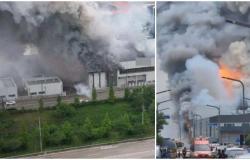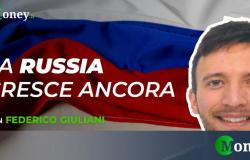The diplomatic offensive that Prime Minister Meloni and Minister Urso are about to launch for Chinese cars must also take into account the impact of the G7 that took place in our country
FROM OUR CORRESPONDENT
FASANO (BRINDISI) — Twenty-four hours before the start of the G7, the Office of Foreign Assets Control (Ofac) published new “instructions” that shed a different light on the results of the Apulian summit. That office is the sanctions area of the US Treasury. And just on the eve of the leaders’ meeting he gave an “updated definition” of what he considers the “military-industrial base of Russia”, with which any form of cooperation is prohibited. The revision – notes Ofac – reflects «the growing use by the Kremlin of the entire Russian economy to support the war.” From now on almost any form of trade with the country of Vladimir Putin and almost any activity within it — even in heavy industry — exposes them to American sanctions.
Thus the White House laid the foundations for a G7 breakthrough on China. In the first year of the war alone, the latter’s exports to Russia had increased by 46.9%, even in products for dual civil and military use. Now the Fasano summit takes up the line that Anthony Blinken, US Secretary of State, had already explained to Beijing at the end of April: Chinese banks (and those of other countries) that facilitate trade with Russia in prohibited goods will be hit; essentially, they all risk being cut off from the international Swift payments system and would no longer be able to touch a single dollar.
It is probably the most effective measure taken against the Russian economy in these two years. The fear of retaliation is already keeping large institutions such as Industrial and away from Russia Commercial Bank of China or Bank of China, but above all it slows down the smaller ones who financed most of the exchanges. Thus in the first four months of 2024 – according to the latest data from the Russian Customs Service – Moscow’s imports are decreasing annually by 4.2% in mechanical engineering, by 19.8% in chemical products, by 11, 6% in metallic ones.
As seen by the Sherpas in Washington, it works. For this reason they wanted to include the threat in the statement of the Seven in Fasano: «We will impose restrictive measures to prevent access to our financial systems for persons and entities from third countries, including Chinese entities, who engage in activities» to the detriment of the Ukraine. Never before have European countries, including Italy, taken such a clear position towards the People’s Republic (where the European Union invoices over 230 billion dollars in exports per year).
Just two problems remain. The first is that the measures from Brussels against the Chinese trade triangulations with Russia remain much weaker than the American ones. The fourteenth European package of sanctions, currently under negotiation, simply indicates a list of Chinese companies to which Europeans cannot sell certain products, so that they do not end up in Russia. Nothing more. Certainly less than Washington would like, but Europe fears retaliation from Beijing and thus confirms itself as the earthenware vessel in tensions between superpowers.
Then there is a purely national question and concerns the diplomatic offensive that Italy is about to launch towards China. Business Minister Adolfo Urso will be in Beijing on 4-5 July and underlines to Corriere how the current government has never used its “golden power” to block Chinese acquisitions. Therefore, Prime Minister Giorgia Meloni is scheduled to visit President Xi Jinping on 29-30 July. Also under discussion is the investment of Dongfeng, a Chinese car manufacturer under total public control, to compensate for the industrial capacity that Stellantis leaves idle in Italy: according to Urso, for an annual production of at least 400-500 thousand Chinese electric cars ( but recalling, it seems, ancient Italian brands in disuse and now owned by the ministry). It now remains to be seen whether the harshness towards Beijing, precisely in the Italian G7, will produce Xi’s adverse reaction.
Moreover, Fasano’s declaration is not only severe towards China. There is also what appears to be a warning from the G7 to the American Citigroup and to the European banks, including Intesa Sanpaolo and Unicredit, which remain active with branches in Moscow: «We appeal to the financial institutions to refrain from supporting and making profits thanks to Russia’s war machine – we read -. We will take further measures to discourage and prevent these behaviors.” Intesa and Unicredit underline that they have greatly reduced their operations in Russia and in any case only work in sectors unrelated to sanctions. But the game remains more open than ever. The government instead scores a point for Eni at the G7, because it has been decided that Italy will host the first ministerial summit on nuclear fusion: an area in which the energy group is very committed.
Subscribe to L’Economia’s newsletters
The ideas of Ferruccio de Bortoli and Daniele Manca
Facts and people read through the lens of economics.
Whatever it Takes by Federico Fubini
The challenges for the economy and markets in an unstable world

Europe Matters by Francesca Basso and Viviana Mazza
The Europe, the United States and Italy that count, with innovations and important decisions, but also small notable stories

One More Thing by Massimo Sideri
From the world of science and technological innovation, news that changes our lives (more than we think)
And don’t forget the newsletters
The Economy Opinions and The Economy 6pm
June 16, 2024 (changed June 16, 2024 | 07:53)
© ALL RIGHTS RESERVED








